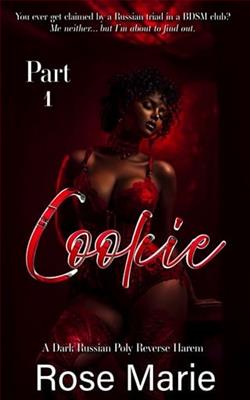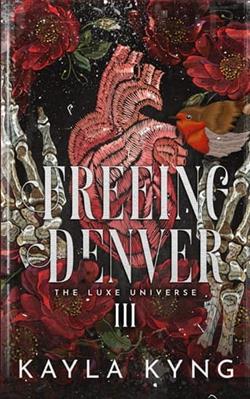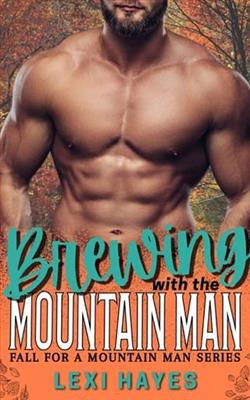Page 42 of Death Valley
The figure is too far away to make out clearly, but something about its stillness sends chills through me. No hiker would stand like that, so utterly immobile in the biting wind.
Seeming to stare right at us.
Jensen raises his rifle, peering through the scope, and for a moment I fear he’s going to shoot the person. Then, whatever he sees causes his jaw to tighten before he lowers it.
“Mount up,” he orders, voice clipped. “Now.”
“What is it?” I press, but he’s already swinging onto Jeopardy’s back. “Who is it?”
“Now, Aubrey.”
The urgency in his voice propels me into action. I scramble onto Duke, wincing as my stiff muscles protest. The others follow suit, no one but me questioning Jensen’s sudden shift in demeanor.
We press on at a pace that borders on reckless given the narrow trail and steep drops. The horses sense our anxiety, their ears pinned back, nostrils flaring. Twice Duke nearly stumbles on loose shale, and I have to fight to keep the both of us on the trail.
“They’re gone now,” Cole says, but no one responds. We don’t turn around either, just keep riding forward.
The trail curves around a massive outcropping, then begins a final ascent toward the ridgeline above. As we climb, the wind shifts, now carrying the scent of diesel and asphalt—a jarringly modern but welcome intrusion that signals we’re nearing Interstate 80 that now crosses Donner Pass.
“Almost there,” Jensen calls back, though his voice is nearly lost in the gusting wind.
The summit appears suddenly as we crest the final rise, a saddle between peaks, where the mountains briefly part to allow passage from one side to the other. The view is breathtaking, both literally and figuratively at this altitude: the steel-blue expanse of Donner Lake below, the endless procession of Sierra peaks stretching to the horizon, the distant ribbon of the interstate cutting through the pass.
But it’s what lies directly ahead that draws my attention, a series of dark openings carved into the mountainside. Tunnels, their entrances like gaping wounds in the pale granite.
“The old railroad tunnels,” Eli explains, seeing my expression. “Built in 1867, abandoned when they rerouted the line in the 1990s.”
“We’re going throughthere?” The prospect of entering those dark maws makes my already racing heart skip a beat, even though there are ugly signs of civilization with countless graffiti tags across the rock.
“Fastest way across,” Jensen says, though his expression is wary. “Fast is good with the weather changing. We’ll only have to take a few of them and then we’re back on the open trail.”
And with us being followed by who the hell knows what, I think.
As if the weather hears Jensen, the wind gusts stronger, carrying the first stinging particles of sleet. The storm is approaching faster than any of us anticipated.
“Looks like we don’t have much choice,” Red observes, eyeing the darkening sky.
“Single file through the tunnels. Stay close, stay together,” Jensen commands. His eyes meet mine, serious. “Horses spook easily in the dark and we don’t know what’s in there. It’s a popular place for hikers and sightseers. Kids might be running about. Keep a firm hand on Duke’s reins.”
I nod, swallowing the knot of anxiety in my throat. There’s something primal about the fear of dark, enclosed spaces, something that goes beyond reason and taps into more ancient instincts. Honestly, I welcome the idea of kids running around and spooking the horses. Would at least give a sense of normalcy where the only other creatures we’ve seen so far seem to be no more than shadow.
“Bring your flashlights out,” Jensen orders, producing his own from his pocket. “Eli, take the lead. I’ll bring up the rear.”
We reorganize our line, Eli moving to the front with his powerful beam cutting through the gathering gloom. I fall into position behind him, with Red, Cole, and Hank following. Jensen brings up the rear, a solid presence at our backs that provides more comfort than I care to admit.
As we approach the nearest tunnel entrance, the temperature seems to drop further, the air becoming dense, almost resistant. The horses grow increasingly nervous, snorting and tossing their heads. Duke’s entire body trembles beneath me, and it takes all my strength to keep him moving forward.
“Easy, boy,” I murmur, stroking his neck. “Just a tunnel. Nothing to be afraid of.”
But as the darkness swallows us whole, I find myself wishing I believed my own reassurances.
It’s wonderfully dry inside the tunnel but the darkness is absolute, the flashlight beams creating narrow corridors of visibility that do little to dispel the overwhelming blackness pressing in from all sides. The temperature drops immediately, a cold that seeps through layers of clothing to settle against the skin like damp silk.
The tunnel is wider than I expected, designed to accommodate rail cars, but the ceiling feels oppressively low. Water drips somewhere in the darkness, the sound echoing strangely, making it impossible to determine its origin. Our horses’ hooves create a hollow, rhythmic percussion that bounces off the stone walls, multiplying until it seems like we’re accompanied by an invisible herd.
“Watch your head,” Eli calls back, his voice tight. “Ceiling drops in places.”
I duck instinctively, though his flashlight reveals nothing but empty space above. The beam catches ancient timber supportsat regular intervals, the wood blackened with age and moisture. Graffiti covers the walls, some fresh and garish, others faded to ghostly impressions. Names, dates, symbols. Generations of people marking their passage through this manmade cavern.















